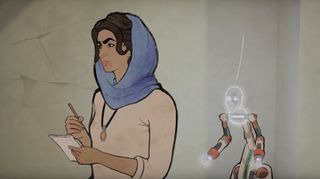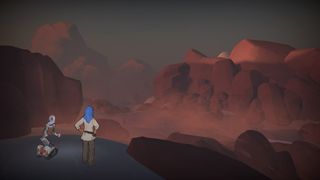What indie developers think of Unity in 2018
We spoke to several studios working with the famously accessible engine to see how they feel about where it's at.

No development tool has had quite the same impact on indie games as Unity. Its impressive knowledge database, flexibility, and tiered pricing scale all ensure that Unity is one of the most accessible engines available. According to Unity’s website, five billion copies of Unity-driven games have been downloaded since late 2016. Even Telltale might be jumping on board the Unity train soon.
The 'Unity Look' many gamers lament may become a thing of the past, but who knows.
Ethan Redd
Unity is currently changing things up quite a bit with its annual version update, 2018.1, which went into beta in January. Unity 2018.1 is putting an emphasis on performance and graphics, and is expected to expand on what developers can do with the tool in some big ways.
The updates and tweaks arriving in the version update can get quite technical, so we opted to talk to a few indie developers about their thoughts on Unity 2018.1. Is it the panacea for the plentiful challenges facing indie developers, or is the update honing in on the wrong issues?
What developers think
The developers we spoke with were most excited about Unity 2018.1’s Scriptable Render Pipeline and the new job system. The pipeline gives players a lot more control over their graphics and rendering. Ethan Redd, who is currently working on mech schmup Blazing Legion: Ignition feels it will better enable artists to explore their individual styles. "I'm a huge proponent for heavy stylization, and more explicit control over rendering is always welcome," he says. "The 'Unity Look' many gamers lament may become a thing of the past, but who knows."
The new job system is going to have a big impact on performance, especially for consoles. As it stands now, Unity relies on single-core performance, which is bad news for our console neighbors who have it pretty lousy when it comes to single-threading. The new job system instead embraces multi-threading, which will grant a huge boost in performance across all platforms.
The greatest impact will likely be seen by smaller developers, who will now be able to attempt projects that embrace a much wider scope. "Assuming the backwards compatibility is solid this time around, it'd be a huge boon for games like mine with hundreds or even thousands of active entities on screen at a time," Redd says.
However, immediately jumping over to a freshly baked version of Unity is often not worth the headache. Many of these developers are in mid-development on existing projects, and the change could prove risky. Inkle’s Joseph Humfrey, whose team is working on sci-fi narrative adventure Heaven’s Vault, notes that many developers only switch to newer versions of Unity out of absolute necessity. "Each version brings new features, but also new surprises," Humfrey says. "While the geek in me looks forward to the opportunity to try out new toys, my pragmatic side dictates that updating immediately could cause problems."
PC Gamer Newsletter
Sign up to get the best content of the week, and great gaming deals, as picked by the editors.

Most of the developers we spoke with cited backwards compatibility issues with different versions of Unity. New bugs and changing features can drastically set back projects already operating on a tight deadline. "When you’re working towards a deadline such as a demo for a publisher or for the public, you need a rock-solid foundation to build on," Humfrey adds.
To be blunt, making games in Unity is wonderful right now but shipping them is a bit of a nightmare because of bugs
Bennett Foddy
Redd seems to agree. "All of these new features are incredible, but as someone midway through the lifecycle of their current project, I doubt I'll be leveraging them. Unity is notorious for their lack of backwards compatibility even between minor version updates, with major version updates being more or less a roll of the dice. I just recently upgraded from 5.x to 2017.x and some techniques I was using for my core gameplay had to be re-implemented because certain under-the-hood things simply didn't work how they used to anymore."

Bennett Foddy, creator of QWOP and Getting Over It, says developers commonly advise others not to upgrade to newer versions because bugs are a such huge issue. "To be blunt, making games in Unity is wonderful right now but shipping them is a bit of a nightmare because of bugs in the systems (particularly in iOS rendering and the 2D physics systems). A ridiculous amount of the development time on Getting Over It was spent trying to fix things that turned out to be bugs in Unity, some of which were regressions," Foddy says. "Being close to bug-free should be the number one priority, and I would like to see Unity spend a whole release cycle (or two) on stability and unit testing. I know that’s boring, but it would make a huge, huge difference."
Backwards compatibility is just one item on the list these developers want Unity to work on. The team at Inkle are masters when it comes to interactive storytelling, but their games aren’t incredibly demanding in terms of performance. Still, they have suffered from stability problems, and they aren't alone. Unity has struggled with maintaining a steady stream of new bells and whistles while ensuring the engine is stable. Humfrey says simple stability is the one thing he’d like to see from Unity in the future.
Redd is on the same page, going so far as to call for Unity to put a hold on new features and simply focus on streamlining the engine. "Unity has this tendency to announce so many wonderful new and shiny features you didn't know you wanted, while certain quirks, inconsistencies, and quality of life fixes fall by the wayside," he says.

Despite the bugs we see, it's an excellent tool that genuinely democratizes game development for smaller developers.
Joesph Humfrey
Viktor Thompson of Asymmetric Games, whose stick figure RPG West of Loathing was our pick for Best Comedy Game of 2017, hopes that Unity will continue to expand in the future. In fact, he feels that many developers may not even need to move beyond Unity to other technology if the engine continues on its current trajectory. "As the engine becomes more customizable, the desire to move to other technology—to 'graduate' from Unity—may be pushed farther down the road or eliminated," he posits. "At the same time, the Unity system can become a more appealing choice for experienced developers who want control, but don't have the time or the money to spend developing their engine from scratch."
The future of Unity
Unity is still the great equalizer when it comes to indie game development. It remains accessible to newer developers working on a budget, but provides the tools more experienced studios need. Humfrey thinks we’re heading in the right direction. "Despite the bugs we see, it's an excellent tool that genuinely democratizes game development for smaller developers."
Foddy certainly sees accessibility as the engine's great strength, but is worried that Unity 2018's emphasis on performance features could leave beginner developers behind. "From Unity's point of view, gamers associate [Unity] with ugly or low-performance games, so I guess that's why they’re focusing so heavily on performance right now," Foddy observes. "Having said that, I'm worried that some of the changes they’re making in pursuit of performance will make the engine less beginner-friendly, and less prototype-friendly, just by adding a lot of complexity. If that happens, the engine will ultimately become less relevant to beginners and indies and it’ll be battling for the same market niche as Unreal and CryEngine."
Unity has been pivotal in the indie games boom. Now we're starting to see the path it might be headed toward in the future. Will Unity continue to be welcoming to new developers while still appealing to creators looking for more performance-heavy tools? Ethan Redd is hopeful for the future of indie development on Unity. "Much like Twine and GameMaker, Unity has done well to embrace the DIY culture flourishing in the modern indie games sphere," he reflects. "As long as they remember their roots, I believe they will prosper as a pillar in the community."
Most Popular

